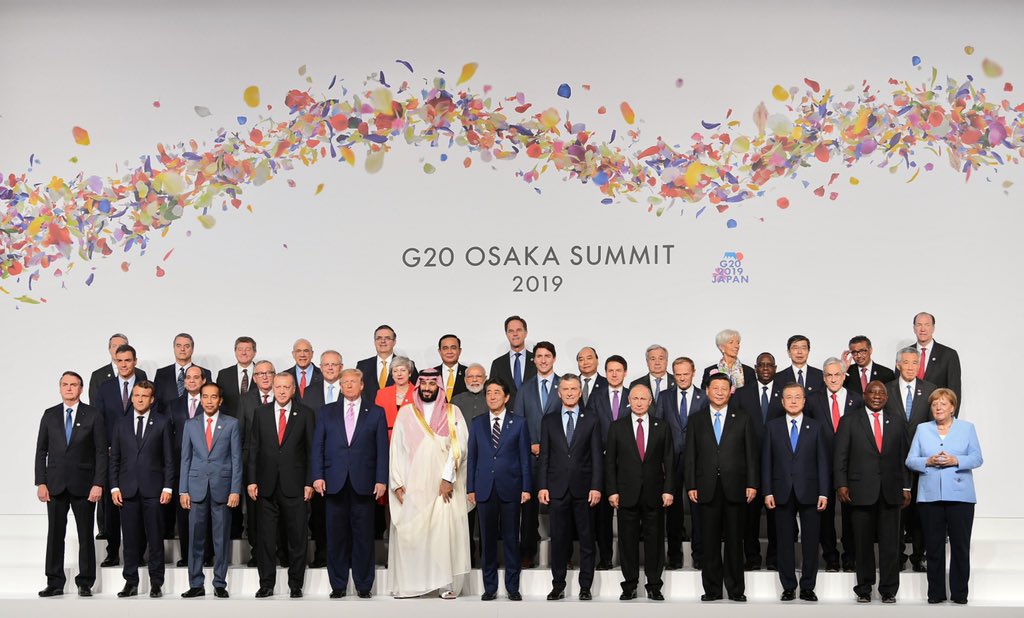Last Updated on June 29, 2019 3:28 pm by INDIAN AWAAZ
Next G20 summit will be held in Saudi Arabia

AMN / OSAKA
Leaders at the G20 summit have wrapped up their 2-day meeting with a joint declaration including agreement to make united efforts to address major global economic challenges.
The countries have affirmed to work together to foster global economic growth while harnessing the power of technological innovation, in particular digitization and its application for the benefits of all.
The joint declaration stops short of referring to the need to fight protectionism.
That was also the case in the previous G20 summit in Buenos Aires — where members disagreed over trade practices.
G20 Osaka Leaders’ Declaration
Another topic of discussion at the G20 was the digital economy. Abe is promoting a pet project called “Osaka Track,” which is a loose set of guidelines to govern the global flow of data and e-commerce.
In a final statement at the end of the two-day summit, nineteen members of the grouping, except the United States, agreed to the irreversibility of Paris climate deal and pledged its full implementation.
Briefing media, India’s Sherpa Suresh Prabhu said, India under the leadership of Prime Minister Narendra Modi played a very pro-active, positive and forward role and raised various issues at the summit. Mr Prabhu said, India has been championing anti-corruption measures at global level. He stressed on the need for member countries to fight corruption and combat foreign bribery.
Mr Modi took part in the G-20 Session on Quality Infrastructure Investment and Development Cooperation. He laid special emphasis on building a disaster resilient future and invited member nations to join the International Coalition on Disaster Resilient Infrastructure. Mr Modi said, such infrastructure is required not only for development, but is also necessary to combat natural calamities. The Prime Minister had mooted this idea at the G-20 meet in Argentina last year to help the smaller nations especially after calamities.
At the 3rd session of the G-20 today, the Prime Minister emphasised on healthcare including India’s traditional healing measures, yoga and Ayushman Bharat. Mr Modi said, 5A’s are well known in Health Services: Accessible, Affordable, Appropriate, Accountable and Adaptable. He said, to this, India has added AYUSH – Alternate and Traditional System of Medicine and Ayushman Bharat – world’s largest health insurance scheme.
The Prime Minister took part in a special session on women empowerment. External Affairs Ministry spokesperson Raveesh Kumar told reporters that the session witnessed an in-depth dialogue on how to further empower women and work towards gender equality.
Mr Modi also held bilateral talks with the Presidents of Turkey, Brazil, Indonesia and also his Australian counterpart Scott Morrison. In his meeting with Turkish President Recep Tayyip Erdogan, the Prime Minister discussed the issues of expanding co-operation in trade and investment and defence sector.
During his meeting with Indonesian President Joko Widodo, the two nations set a target of 50 billion US dollars for bilateral trade over the next six years. They also discussed ways to deepen bilateral cooperation in defence and maritime fronts.
Mr Modi also held wide-ranging talks with Brazilian President Jair Bolsonaro. The Prime Minister said in a tweet that the meeting with the Australian Prime Minister will add vigour to bilateral ties and lead to new areas of co-operation. Mr Modi has since left for home after concluding his three-day visit to Japan.
As the summit chair, Japan’s prime minister hailed the efforts of national heads to work together toward global growth and confront risks to prosperity.
The meeting took place amid growing protectionist sentiment in the US and some other countries.
Abe said, “We were able to clearly reaffirm basic rules for free trade, such as liberalism, fairness, indiscrimination, an open market and fair conditions for competition.”
Abe said, “We will move quickly to set international rules to ensure the free transnational flow of data while securing safety and privacy. Such an effort will surely bring a fresh breeze into the process of WTO reform.”
On the environmental front, Abe says the leaders endorsed a framework to cut back on plastic waste dumped in the ocean.
He said, “We were able to take a big step forward to solve the problem by sharing the ‘Osaka Blue Ocean Vision,’ which aims to reduce new pollution to zero by 2050. We were also able to agree on a framework to implement concrete steps toward the goal.”
The G20 next year will be held in Saudi Arabia. Abe offered Japan’s continuing support, and said he hopes the new host can take the lead to put together a set of strong recommendations.
